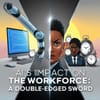Artificial intelligence is significantly impacting the workforce, with both positive and negative effects. According to recent reports, AI is projected to displace 85 million jobs while generating 97 million new roles by 2025, driven by automation and redefinition of work processes.
The impact of AI on jobs is already being felt, with companies like Amazon, Microsoft, and Meta laying off workers due to overlapping functions with AI systems. However, new roles are emerging in AI model operations, ethics, data governance, and prompt engineering, offering opportunities for those with the right skills.
To navigate this changing landscape, workers will need to reskill and upskill to remain relevant. Companies are investing in AI training programs, and startups are leveraging AI to personalize reskilling, offering tailored learning paths and real-time feedback.
As AI continues to transform the workforce, it's essential to focus on developing skills that complement AI, such as creativity, judgment, and communication. By doing so, workers can unlock new opportunities and thrive in an AI-driven economy.
The future of work will be shaped by AI, and it's crucial to be prepared. By understanding the impact of AI on the workforce and taking proactive steps to develop new skills, workers can position themselves for success in a rapidly changing job market.


